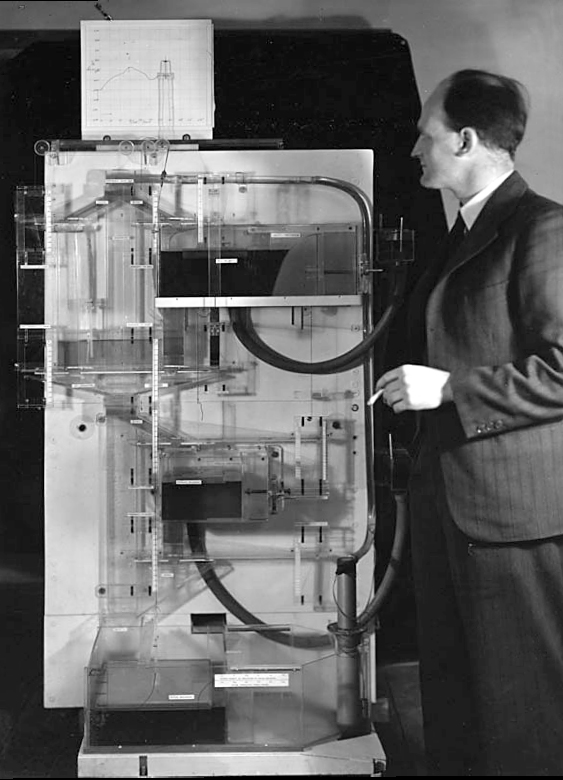hydraulic economics
I just started reading1 Herbert Simon’s The Sciences of the Artificial2 and he has a couple of references to models of economic processes implemented hydraulically.

As seems to be emerging as a common theme on this blog, it is something that I’d been thinking about for a while, but hadn’t got around to looking to see if anyone had already done it. He mentions the MONIAC computer, designed to do Hydraulic macroeconomics for the British economy. As Simon explains, the model was very limited in its usefulness, far from a universal computing machine, and was very quickly replaced once digital computers came into use.
The thing that interests me though is that it was thought up at all. It seems like an obvious metaphor that you would model the flows of resources (mainly money in this case) in an economy by using the flow of a liquid between chambers. This kind of simple mapping is probably not very good for the people who built the MONIAC, but was probably hugely useful to others who could watch the ‘program’3 running. For school children this kind of tool would be great.
Of course we are now in a world where it makes very little sense to do this sort of simulation with physical liquids and pipes when we can do it faster and more easily with a computer, as people like Steve Keen are with Minsky. But I wonder if there is some benefit to learnability to get people going from using an analogy that they already understand.
My initial thoughts around hydraulic economics were actually not about the flow of money or resources in the common sense, but about the flow of information. I was thinking about how information could move about in a system, how it would affect the system ‘underneath’ it, and what metaphors I could use to explain it. I got pretty stuck, but a few things seemed obvious; information didn’t ‘flow’ like a perfect fluid, there were all kinds of disturbances and turbulence, things like blocked pipes that would seep information through until the pressure pushed the blockage through.
I’m not really that interested in developing a hydraulic model of information flow in economies (although I’d be really into reading about someone else doing it). What really interests me is that it’s possible at all to use these kinds of imperfect models to understand things. The gaps between my mental simulation of the model, and my mental version of ‘the truth’ seem to be where the real insight lies.
-
not on my reading list, but I think I might have to admit defeat when it comes to The Master and His Emissary
, at least until I have a lot more patience and a bigger run up at it. ↩
-
It is really good so far, I’m amazed that I’ve been able to go this far without someone forcing me to read it! ↩
-
A set of valve settings I’d imagine ↩